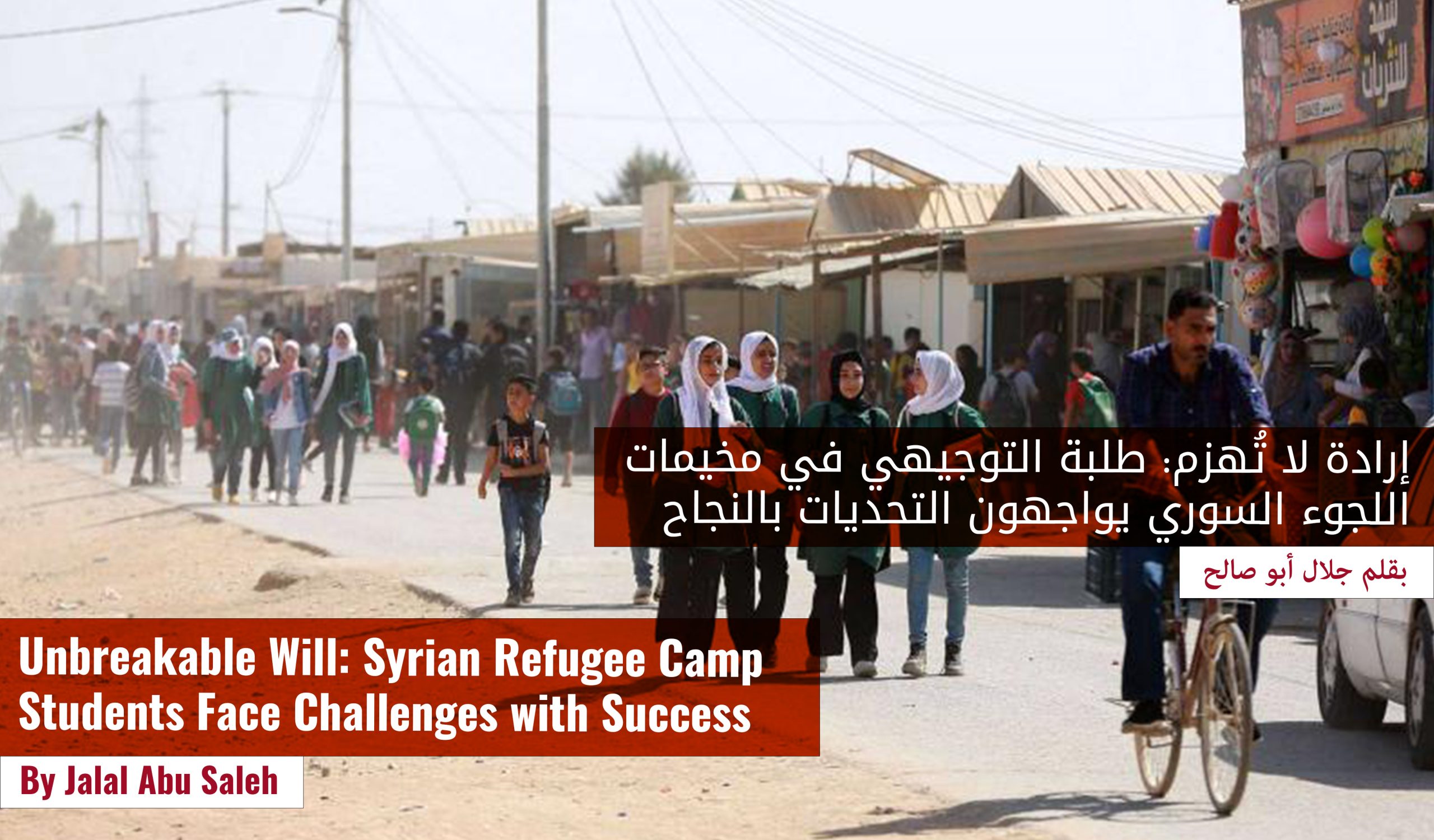“I used to study under small lamps when the electricity went out… determination was the strongest weapon for success.”
With these words, Muhannad (a pseudonym) from Za’atari Camp summarizes his journey with the General Secondary Education Certificate Examination (Tawjihi), capturing in a single sentence the hope of hundreds of Syrian refugee students who have found in education a final refuge to hold on to the future.
Amid these circumstances, hundreds of Syrian students continue their studies with remarkable perseverance. They still succeed in turning challenges into human stories that inspire others and remind us that education is the last window of hope in the face of protracted displacement. Success is achieved through education despite the realities of exile and the pressures of economic hardship. What stands out most about these successes is that each story carries within it a message of hope and resilience—affirming that education is not merely an academic pursuit, but a daily act of resistance against despair.
As part of its mission to uphold the right to education as a cornerstone of development and social justice, the Arab Renaissance for Democracy and Development (ARDD) continues to comprehensively monitor the education system in Jordan through the National Alliance for the Future of Education in Jordan (NAFE), which aims to enhance opportunities for quality and inclusive education. This aligns with ARDD’s own Education Strategy, launched to ensure access to quality education and provide lifelong learning opportunities for all as essential pillars for poverty reduction and sustainable social transformation.
The organization has also worked to strengthen access to inclusive education through projects such as “Investing in the Future”, “Education for the Future”, and “Enhancing Learning to Improve Life Opportunities for Students in Jordan”, in addition to initiatives like “Empowering Each Other”, “Comprehensive Access of Children to Justice”, and “Our Right”. These initiatives targeted the most marginalized groups, including refugees and children with disabilities.
Success Stories from the Camps
Behind the percentages and statistics lie human stories filled with determination. Students from Azraq Camp, Za’atari, and Mrajeeb Al-Fhood did not stop at the daily difficulties, but transformed them into motivation for persistence and success.
Sidra (a pseudonym) affirmed that the road was not easy. Many days she felt exhausted, but the psychological support from her family and teachers was the biggest motivator to continue. She explained that she did not succeed just for herself, but to prove that a girl in the camp can achieve her dreams no matter the circumstances.
Reham (a pseudonym) said that the Tawjihi exam was not just an academic milestone for her, but the beginning of a longer journey. She wanted to serve her community and be part of change, especially for girls who think opportunities are out of reach”. She emphasized that success gave her greater confidence that education is the only way to break the cycle of challenges they face daily.
Mahmoud (a pseudonym) reflected that success was not just a personal achievement, but a gift to his family who sacrificed so much for him. He wanted them to feel that all they endured was not in vain.
Nizar (a pseudonym) described his persistence by saying he always told himself if I do not build my future myself, no one will. His success was not just personal joy, but a message to anyone who thinks camp life means the end of ambition. On the contrary, it is the beginning from which patience is learned and hope is created.
Abdel Jabbar (a pseudonym) explained that he often faced fatigue and exhaustion, but the image of his family waiting for his success kept him going. Success, he said, is a proof that effort never goes to waste, and that a person can change their reality no matter how harsh. “I dream of completing my university studies and contributing to building a better future for my community”, he added.
Maram (a pseudonym) used to repeat that circumstances will not determine her future. The path may be full of obstacles, but in every obstacle she sees a new opportunity to stand firm.
Multi-Stakeholder Support
In this regard, ARDD stresses the importance of strengthening educational and psychological programs inside the camps, providing accurate data in cooperation with the Ministry of Education to facilitate planning, and expanding university scholarship programs that open new horizons for successful students. It also calls for highlighting success stories in the media to inspire other students and promote a culture of determination—affirming that education is not just numbers in gradebooks, but a force capable of rebuilding hope and shaping change.
Education: A Renewed Space of Hope
The success stories of Tawjihi students in Syrian refugee camps are not just individual tales, but living testimony that education remains an investment in the future and a pillar of human dignity. These students, through their modest means and great determination, have proven that the camp is not the end of a dream, but may be the starting point toward a new hope—paving the way for return to their homeland to participate in its reconstruction, or opening opportunities for dignified living and positive contribution in any society they settle in.
Even if success rates seem modest compared to normal conditions, in the camps they represent an extraordinary achievement. While students continue their journey with steady steps, the most important question remains: will the future be wide enough to embrace their ambitions, or will it remain suspended within the limits of the camp?
These successes carry within them a message to the international community: investing in refugee education is not limited to building individual skills, but is an investment in long-term peace, development, and stability.
Note
*Mrajeeb Al-Fhood Camp, also known as the Emirati-Jordanian Camp, was officially closed as of July 1, 2025.



